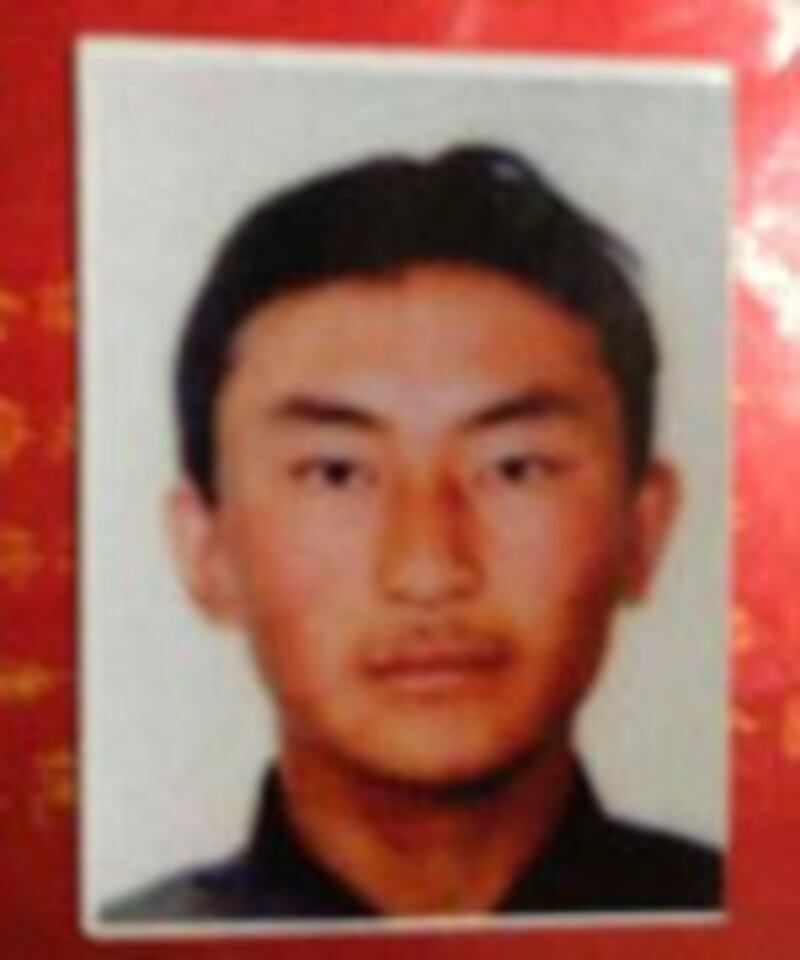A Tibetan man protested against Chinese rule by burning himself to death on Monday at the gates of a monastery in Gansu province, emulating his cousin's self-immolation in the same area more than two months ago, sources said.
Monks at Shitsang Monastery and other local Tibetans in the Kanlho Tibetan Autonomous Prefecture’s Luchu (Luqu) county jostled with Chinese security forces before taking away the body of Tsezung Kyab, aged 27, from the self-immolation site, the sources said, speaking from inside Tibet.
"He performed the self-immolation around 1.30 p.m. in protest against Chinese policy in the Tibetan areas. His body is in the custody of the local Tibetans," one source told RFA's Tibetan Service.
Tsezung Kyab was the 106th Tibetan so far to self-immolate in protest against Chinese rule and calling for Tibet's exiled spiritual leader the Dalai Lama to return to Tibet.
He had followed in the footsteps of his cousin Pema Dorjee, who self-immolation in front of the Shitsang Monastery on Dec. 8, 2012, another Tibetan source said.
"He is the maternal cousin of Pema Dorjee, who also self immolated in Luchu against the Chinese policy, and they are from Chokor village, an affiliate of the 12th Shitsang nomadic area in Luchu," the source said.
After the monks gained control of Tsezung Kyab's body, which was taken to his home village of Chokhor, several hundred armed Chinese police arrived at the monastery and imposed restrictions in the area, sources said.

Tibetan festival
Free Tibet, a London-based advocacy group, said many Tibetans had gathered at the monastery when the protest took place as Monday was the last day of the Tibetan Monlam prayer festival.
"Chinese Public Security Bureau personnel attempted to extinguish the flames and remove the body [of Tsezung Kyab] but were prevented from doing so by local people," the group said.
“China’s heavy-handed response to self-immolations has failed to stem the tide of protest in Tibet," Free Tibet Director Stephanie Brigden said in a statement.
"The spirit of dissent among Tibetans is far stronger than China realizes. We can only expect that protests will continue to take place until Tibetans achieve the freedom they crave.”
Meanwhile, a young Tibetan who torched himself at a monastery in Qinghai province on Sunday in protest against Beijing's "hardline" policy in Tibet died on Monday after suffering serious burns, a Tibetan source told RFA.
Phagmo Dhondup, in his 20's, set himself alight at the compound of the Jachung monastery in Tsapon township in Tsoshar (in Chinese, Haidong) prefecture’s Bayan Khar (Hualong) county and was immediately taken to a nearby hospital.
"He was taken to the local hospital in Bayan county by the monks of Jachung monastery immediately after the incident but he could not be saved and succumbed to his burns," the source said.
Beijing has stepped up its crackdown against Tibetan self-immolation protests but to no avail.
Chinese courts have jailed a number of Tibetans, including monks, over their suspected roles in the burnings in the last few weeks. Some have been given jail terms of up to 13 years.
Human rights groups have criticized the Chinese authorities for criminalizing the burning protests and cracking down on Tibetans deemed to have provided encouragement or support.
Chinese authorities have also deployed paramilitary forces and restricted communications and travel in the areas where self-immolations have occurred.
Many of the recent self-immolators are young Tibetans appalled by the human rights abuses and excessive controls imposed by the Chinese authorities, rights groups say.
Reported by RFA's Tibetan Service. Translated by Karma Dorjee. Written in English by Parameswaran Ponnudurai.
